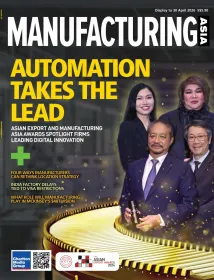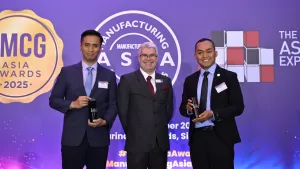Why industry collaboration is key in reducing carbon emissions
Sustainability is not just a goal but a necessity.
With manufacturing companies in Asia accounting for approximately 20% of global carbon emissions, industry leaders highlight the importance of collaboration and innovation to effectively reduce these emissions within the built environment.
Jayant Kaushal, APAC Deputy President of Camfil, emphasised that collaboration with stakeholders is crucial. "The industry needs to collaborate with a number of stakeholders to understand how they are working, and how we can work together to achieve the carbon emission net zero in times to come," Kaushal stated.
Shantanu Gangakhedkar, Senior Consultant at Frost & Sullivan, added that achieving net-zero emissions requires supporting infrastructure and technology. He illustrated this with the example of the aviation industry, noting, "If we want an all-electric aircraft to be deployed in the next few years, we need the supporting battery technology to also be developed at a similar pace."
Senarat Jayasekera, Regional President/Managing Director at Wacker Neuson, emphasised the importance of a mindset shift within the industry. "The mindset and the mentalities have to change for the customers, or the industry must accept the innovations," Jayasekera said. He stressed the need for a gradual progression: "Before we could run, we should be able to crawl."
Cross-company collaboration for technological advancement
To tackle these challenges, collaboration between established companies and emerging organisations is essential. Gangakhedkar noted the benefits of technology sharing and financial funding, stating that "larger, established organisations" and newer companies can "share expertise and knowledge of technology" to speed up development.
Kaushal added that working closely with other manufacturing companies is crucial for sustainability. "If they tell us what they need, then companies like us will be able to create or innovate products which are required for that particular kind of application," he said, highlighting the importance of tailoring solutions to industry needs.
Jayasekera stressed the need for continuous innovation and training. "We have to change the mindset, and at the same time train and convince the others," he said, noting that Wacker Neuson is developing battery technology to support zero-carbon emissions, which will be shared with competitors to create "one level platform."
Emerging technologies to drive net-zero goals
Emerging technologies hold significant potential for reaching net-zero carbon emissions. Jayasekera pointed out that in the construction industry, battery technology is replacing diesel engines, resulting in "zero emission in the way of exhaust emission" and reduced noise pollution. This approach drastically cuts fossil fuel use, aligning with sustainability goals.
Kaushal mentioned the role of clean air solutions in reducing emissions, highlighting the use of sustainable energy alternatives like solar panels. "We are the clean air solution providers globally," Kaushal said, emphasising their focus on energy savings, waste reduction, and maintaining air quality for health and safety.
In the aviation sector, Gangakhedkar identified future fuels such as electric and hydrogen as critical for reducing emissions. "Adopting these fuels across the aviation ecosystem…will help drastically reduce emissions," he said. With aviation contributing 2-3% of global greenhouse gas emissions, transitioning from fossil fuels to future fuels is "crucial and critical."
Jayasekera and Kaushal will talk more about manufacturing's emerging technology and sustainability in the built environment industry at BEX Asia 2024 this September in Singapore.













